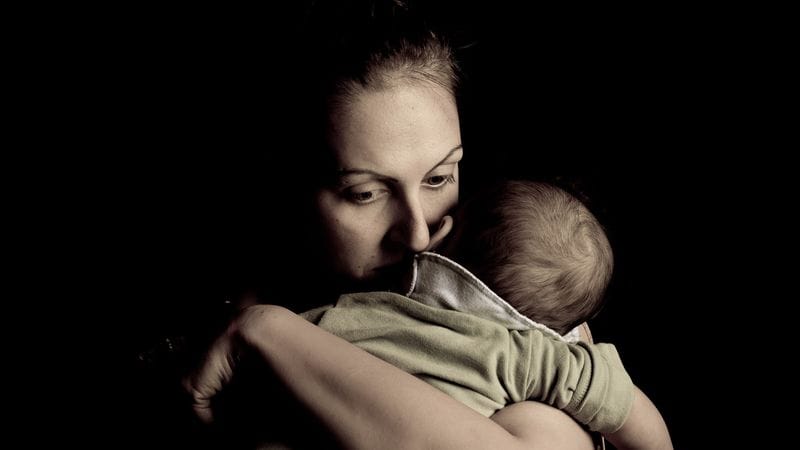Postpartum depression is a profound and often misunderstood condition that affects countless new mothers. It goes beyond the typical ‘baby blues,’ manifesting in ways that can severely disrupt daily life and emotional well-being. Despite its prevalence, many women suffer in silence, believing their feelings are unique or a sign of weakness.
This isolation can compound the stress and anxiety new mothers face as they navigate the complexities of parenthood. Understanding the multifaceted influences of postpartum depression is crucial for both mothers and their support networks.
1. Emotional Instability

Postpartum depression can lead to significant emotional instability. New mothers may find themselves swinging from moments of joy to deep sadness. This unpredictability can be unsettling, making it challenging to manage day-to-day interactions. Feeling disconnected from the baby or partner can exacerbate these feelings. Many mothers describe an overwhelming sense of guilt or failure. They may feel inadequate, questioning their ability to care for their newborn. It’s important to remember these feelings are not uncommon. Seeking professional support can be a crucial step in managing these emotions effectively and rebuilding emotional strength.
2. Sleep Disruption

Sleep disruption is a common struggle for mothers experiencing postpartum depression. The demands of a newborn, combined with anxiety, can make restful sleep elusive. Mothers may find themselves lying awake, unable to silence racing thoughts. This lack of sleep can intensify feelings of fatigue and irritability. The exhaustion can become overwhelming, leading to difficulties in daily functioning. It’s essential to establish a sleep routine and seek help when possible. Even short naps can make a difference. Sharing responsibilities with a partner can provide much-needed rest and help mitigate sleep-related challenges.
3. Loss of Appetite

Loss of appetite is a subtle yet impactful symptom of postpartum depression. Many mothers find food unappealing, leading to skipped meals and imbalanced diets. This can result in reduced energy levels and weight loss, affecting overall health. Nutrition is critical for recovery, and neglecting it can exacerbate depression symptoms. A balanced diet supports both physical and mental health. It’s vital to find enjoyable and easy-to-prepare meals. Consulting with a nutritionist can provide personalized advice. Small, frequent meals and staying hydrated can also aid in maintaining energy and focus.
4. Anxiety and Panic Attacks

Anxiety and panic attacks are common manifestations of postpartum depression. Mothers may experience overwhelming worry about their baby’s health and well-being. These feelings can escalate into panic attacks, characterized by rapid heartbeat and breathlessness. Understanding these symptoms is crucial for managing them effectively. Practicing mindfulness and deep breathing can help. It’s also beneficial to have a support system ready to assist during these episodes. Professional therapy can offer strategies to cope with anxiety. Over time, these practices can help reduce the frequency and intensity of anxiety attacks, leading to a calmer state of mind.
5. Lack of Interest in Daily Activities

Postpartum depression often leads to a lack of interest in daily activities. Tasks that once brought joy may now seem burdensome. Mothers might feel disconnected from hobbies or social engagements. This withdrawal can increase feelings of isolation and loneliness. It’s important to gently reintroduce enjoyable activities. Starting small with simple tasks can help reignite interest. Encouraging participation in social gatherings, even briefly, can be beneficial. Seeking support from fellow mothers experiencing similar challenges can provide comfort and motivation. Gradually, interest and enjoyment in everyday life can return.
6. Feeling Overwhelmed

Feeling overwhelmed is a hallmark of postpartum depression. The constant demands of caring for a newborn can feel insurmountable. Mothers might perceive everyday tasks as daunting. This sensation can lead to feelings of inadequacy and stress. It’s important to prioritize self-care and ask for help. Creating a flexible routine can provide structure and reduce stress. Leaning on a support network, including family and friends, can alleviate some responsibilities. Remember, it’s okay to take breaks and focus on personal well-being. These strategies can help manage the feeling of being overwhelmed.
7. Difficulty Bonding with Baby

Difficulty bonding with the baby is a distressing aspect of postpartum depression. Mothers may feel detached from their newborn, leading to guilt and confusion. This lack of connection can affect maternal instincts and confidence. It’s essential to address these feelings without self-blame. Bonding activities, like skin-to-skin contact, can foster closeness. Speaking with a therapist or joining support groups can provide reassurance and guidance. Over time, consistent efforts can nurture a strong and loving bond. Remember, every mother-baby relationship is unique, and seeking help is a step towards building a positive connection.
8. Persistent Sadness

Persistent sadness is a profound symptom of postpartum depression. Mothers often experience unshakable sadness, making daily life challenging. This sadness can overshadow joyful moments with the baby. Identifying the root causes can be the first step towards healing. Journaling and self-reflection can provide insights into these feelings. Engaging in regular physical activity can boost mood and energy levels. It’s important to communicate feelings openly with loved ones. Professional counseling offers a safe space to discuss emotions. Gradually, these steps can help reduce sadness, paving the way for emotional recovery.
9. Irritability and Anger

Irritability and anger are common but often misunderstood symptoms of postpartum depression. Mothers may find themselves snapping over minor issues. This can strain relationships and increase feelings of guilt. Recognizing triggers can help in managing these emotions. Setting aside time for relaxation and hobbies can provide an outlet for stress. Practicing patience and mindfulness can also be effective. Open communication with family members can alleviate misunderstandings. Seeking professional guidance can offer strategies to cope with irritability. With time and support, mothers can find balance and improve emotional interactions.
10. Cognitive Challenges

Cognitive challenges, such as difficulty concentrating and memory lapses, are often reported by mothers with postpartum depression. These symptoms can affect daily tasks and decision-making. It’s important to acknowledge these challenges without self-criticism. Organizing tasks and using reminders can aid in managing responsibilities. Engaging in mental exercises, like puzzles and reading, can improve cognitive function. Prioritizing rest and nutrition also supports brain health. Reaching out to healthcare providers can offer additional strategies. Over time, mothers can regain their cognitive sharpness and confidence in managing daily life.
11. Physical Aches and Pains

Physical aches and pains are often overlooked symptoms of postpartum depression. Mothers may experience unexplained headaches, backaches, or joint pain. These physical symptoms can exacerbate emotional distress. It’s crucial to address these pains through proper medical evaluation. Regular exercise can alleviate some discomfort and improve overall well-being. Incorporating stretching and relaxation techniques can also be beneficial. Maintaining a healthy diet supports physical health. Professional guidance can provide targeted approaches for pain management. With time and attention, mothers can find relief from these physical symptoms.
12. Feeling of Hopelessness

A feeling of hopelessness can pervade the experience of postpartum depression. Mothers might feel trapped in their situation, unable to see a path forward. This can lead to a sense of despair and withdrawal. It’s vital to recognize these feelings as a symptom rather than reality. Reaching out for help is an important step. Building a support network, including professional guidance, can provide new perspectives. Setting small, achievable goals can foster a sense of accomplishment. Over time, these strategies can help restore hope and motivation, guiding mothers toward recovery.
13. Social Withdrawal

Social withdrawal is a common response to postpartum depression. Mothers may feel disconnected from friends and family. This isolation can deepen feelings of loneliness and despair. It’s crucial to find ways to reconnect gradually. Engaging in community activities or mother-baby groups can provide support. Even virtual meetings can offer a sense of belonging. Encouraging open dialogue with loved ones can bridge the gap. Professional counseling can help in overcoming barriers to social interaction. With time, mothers can rebuild social connections and find joy in shared experiences.

Well, hello there!
My name is Jennifer. Besides being an orthodontist, I am a mother to 3 playful boys. In this motherhood journey, I can say I will never know everything. That’s why I always strive to read a lot, and that’s why I started writing about all the smithereens I came across so that you can have everything in one place! Enjoy and stay positive; you’ve got this!

